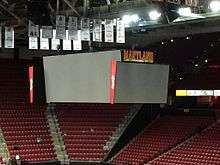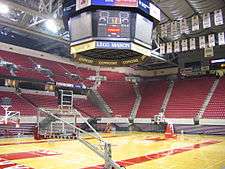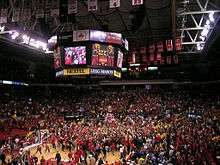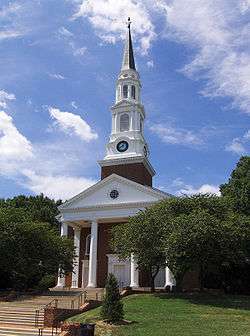Xfinity Center (College Park, Maryland)
Coordinates: 38°59′43.5″N 76°56′29.6″W / 38.995417°N 76.941556°W
|
| |||
|
| |||
| Former names | Comcast Center (2002–2014) | ||
|---|---|---|---|
| Location |
Paint Branch & Regents Dr College Park, MD 20742 | ||
| Owner | Maryland Stadium Authority | ||
| Operator | Maryland Stadium Authority | ||
| Capacity | 17,950 | ||
| Surface | Hardwood | ||
| Construction | |||
| Broke ground | July 1, 2000[1] | ||
| Opened | October 11, 2002 | ||
| Construction cost |
$125 million ($165 million in 2016 dollars[2]) | ||
| Architect |
Ellerbe Becket[3] Design Collective, Inc.[4] | ||
| Structural engineer | Delon Hampton & Associates[5] | ||
| General contractor | Gilbane[6]/Smoot | ||
| Tenants | |||
|
Maryland Terrapins men's basketball
| |||
Xfinity Center is the indoor arena and student activities center that serves as the home of the University of Maryland Terrapins men's and women's basketball teams. Ground was broken in May 2000 and construction was completed in October 2002 at a cost of $125 million.[7] It replaced Cole Field House as the Terrapins' home court, which had served as the home of Maryland basketball since 1955.
The on-campus facility was originally named the Comcast Center after Comcast Corporation purchased a 20-year, $25 million corporate naming agreement when the arena opened in 2002. In July 2014, it was renamed Xfinity Center after Comcast's cable brand, Xfinity.
Xfinity Center, which has a capacity of 17,950,[8] opened for Midnight Madness on October 11, 2002 and the first official men's game was a 64-49 victory over Miami University (Ohio) on November 24, 2002. In its first season, 281,057 fans visited to watch Terrapin basketball games for a per-game average of 17,566 as Maryland finished fifth in the nation in attendance.[9] On January 25, 2012, the court was renamed in honor of Gary Williams, the men's basketball coach who retired the previous year.
Though Xfinity Center is the largest arena in the state of Maryland, it is the second-largest arena in the Washington, D.C. metropolitan area by seating capacity, just behind the Verizon Center in Washington, D.C., which has an official seating capacity of roughly 500 more than Xfinity Center. The facility is also used for concerts, graduation ceremonies including those for the University of Maryland, state high school basketball tournaments, and other special events. Concert seating capacity is nearly 19,000.

Amenities
In addition to the main basketball court, Xfinity Center also features a 1,500-seat gymnasium for volleyball, gymnastics, and wrestling; a 7,000-square-foot academic support center for student-athletes; Heritage Hall, a 400-seat multi-purpose room equipped to host banquets, press conferences, meetings and serve as a pregame restaurant suite overlooking the arena's seating bowl; the Terrapin Team Shop; and administrative offices for most Terrapins athletic programs. Inside the lobby on the east side of the facility is the Terrapin Walk of Fame and History, featuring many images of the past of Maryland athletics as well as the 2002 men's national championship trophy and the 2006 women's national championship trophy.[9]
In 2014, the University replaced the building's original scoreboard with a new, start-of-the-art center hung Daktronics videoboard that features two side displays measuring approximately 12.5 feet high by 33 feet wide and two end displays measuring approximately 9 feet high by 16.5 feet wide making it one of the largest jumbotrons in college basketball. The videoboard can display one single image to show live video and replays, but can also be divided into separate windows to display graphics, animations, game statistics, scoring information and advertisements. The Xfinity Center also features four message displays in each corner of the facility that are used to display closed captioning.[10]
Student section

The student section contains 4,000 seats arranged in the first ten rows on all sides of the arena. The most notable feature of the arena is the steeply pitched kop-style seating area at the west end of the arena behind the visiting team's second half basket, informally known as "the Wall." Originally designed to reduce excavation costs due to a hill, the area features 2,600 student seats meant to intimidate opposing players who shoot free throws in the second half.
Maryland has long had a reputation for having one of the most raucous student sections in the nation for several years before Xfinity Center opened in 2002. Because of the athletic department's online lottery system which distributes tickets to students, most games are student sell-outs. Student attendance is typically highest for conference games, non-conference games against top teams (such as the annual Big Ten-ACC Challenge), and the annual "Maryland Madness" event (formerly, though still colloquially, known as "Midnight Madness") held in October to signify the official start of the college basketball season. Attendance by students is generally lowest for early season exhibition and non-conference games, as well as games played while the students are on Thanksgiving and winter break.
The online ticket system was implemented for both football and men's basketball beginning with the 2002-2003 season, as an alternative to the traditional method which required students to camp out for tickets to big games. Though it is somewhat more fair in that it gives all students an opportunity to attend games without forcing them to give up time waiting in lines, it has come under fire by students for several reasons. Because there are more than twice as many tickets available for football games, these problems are generally not significantly associated with football.
Loyalty Points

Tickets are given via a weighted lottery; students accumulate loyalty points for claiming and attending games and Maryland Madness. Each point gives the student one more entry in the lottery for subsequent games. For example, a student with 10 loyalty points will have his or her name entered 11 times for the game he or she wishes to attend (once by default, and once more for each point); by contrast, a student with zero loyalty points will have his or her name entered only once. Though the system does give a decided advantage to students with more points, as it was designed to do, it is still possible (and somewhat common) for students with no or few points to receive tickets to late season games. This aspect was most commonly debated leading up to the then-annual home game against former ACC foe Duke, when a large number of students request tickets. It was not uncommon for students who have attended every home game to lose the lottery to students who have attended no games.[11]
As a result of the advantages students gain by attending games early in the season against typically underwhelming non-conference opponents, a phenomenon developed known among students as "scanning and leaving." In order to receive a loyalty point, a student must do three things: request a ticket online, claim it (if selected in the lottery) and, finally, present their ticket and student ID at the entrance to Xfinity Center to be scanned and authenticated. Once the student's ticket is scanned and is allowed into the game, the ticketing system awards the student one loyalty point. The student is then free to leave the game whenever he or she pleases. As a result, many "diehard" fans complain that a significant number of students "scan and leave" games, even well-attended conference games, as a means of building up loyalty points for games later in the season with a greater degree of perceived significance and/or a higher chance of demand exceeding supply.[12]
Notable games at Xfinity Center
- December 14, 2002 – In Maryland's debut game against a ranked opponent at the new arena, they fell to the #17 University of Florida Gators, 69–64. Despite a valiant effort, Maryland's inability to contain Anthony Roberson from behind the arc and shooting just 36% from the free throw line led to a less than auspicious christening of the facility against a ranked opponent.
- January 18, 2003 – The Terrapins defeated then undefeated #1 Duke, 87–72.
- February 17, 2003 – Due to a major snowstorm in the area, the game against #10 Wake Forest was postponed from the previous night. Since most ticket holders were unable to travel to College Park, the athletic department instituted an open attendance policy. Anyone with a valid student ID was given free admission and the general public was charged $20. The near-capacity crowd was composed mostly of students enjoying their snowday, and the Terrapins defeated the Demon Deacons, 90–67.
- February 22, 2004 – The third largest crowd to watch an Atlantic Coast Conference women's regular season basketball game and the second largest crowd to watch a women’s game at the arena (13,346), went home disappointed as No. 4-ranked Duke defeated the Terrapins 72–59.

- February 12, 2005 – The Terrapins won their third consecutive game against Duke and became first team to sweep the regular season series from the Blue Devils since Wake Forest did it during 1995–96 season. The 99–92 overtime thriller coincided with a visit from ESPN's College GameDay.
- February 13, 2005 – The No. 18-ranked women's team lost to No. 4-ranked Duke 60–49 in front of the largest crowd to watch an Atlantic Coast Conference women's regular season basketball game (17,243).
- March 20–22, 2005 – Comcast Center (as it was then known) hosted first- and second-round games for the NCAA women's basketball tournament. The No. 7-seeded Terps used their home court advantage to defeat 10-seed Wisconsin–Green Bay but lost to No. 2-seeded Ohio State. In the other games, Liberty became only the second 13-seed to advance to the Sweet 16 by upsetting fourth-seeded Penn State and fifth-seeded DePaul.
- February 7, 2006 – Maryland came from behind to beat Virginia, 76–65, to give Gary Williams 349 wins at Maryland, surpassing the record previously set by Charles "Lefty" Driesell.
- January 28, 2007 – The largest crowd in ACC women's history, 17,950, watched 2nd ranked North Carolina defeat 3rd-ranked Maryland 84–71, surpassing the record set the previous season.
- February 17, 2007 – Undefeated and No. 1 Duke women's team beat #6 Maryland on Senior Day 69–57 on only the second ever sold out game for women's basketball at the Comcast Center.
- January 14, 2008 – The #4 Maryland women's team beat #10 Duke 85–70 at home for the first time in ten years. The crowd of 15,531 is the fifth largest in ACC women's basketball history.
- February 21, 2009 – Trailing by as many as 16 points, and still down by 9 with less than two minutes to go,[13] unranked Maryland came back to beat #3 North Carolina 88–85 in overtime. Maryland fans rushed the court after the upset victory.
- January 25, 2012 – The basketball court was named in honor of Gary Williams, the men's basketball coach who retired after the previous season. That night, the men's basketball team fell to Duke, 74–61.
- February 16, 2013 – Maryland Men's Basketball upsets #2 Duke in a thrilling 83-81 victory. This was the first victory for the Terps against the Blue Devils since 2010 and the first win against a top 3 ranked team since 2009. This also was the first victory against Duke for Mark Turgeon as the head coach for Maryland Basketball.
- March 9, 2014 - Maryland Men's Basketball Team took down longtime rival #5 Virginia 75-69 in overtime. This was the last home game for the Terrapins as a member of the ACC. Also it was the last home game with the Terp's venue being named the Comcast Center.
- February 24, 2015 - Maryland Men's Basketball Team upsets #5 Wisconsin 59-53.
- November 17, 2015 - Maryland Men's Basketball Team defeats the Georgetown Hoyas behind a 24-point performance from guard Melo Trimble. This game was considered a renewal of the old-school rivalry between these teams. It was the first time they had played since 1993.
- January 28, 2016 - First matchup featuring two top-ten ranked Men's Basketball teams in the history of the Xfinity Center. The #8 Maryland Terrapins defeated the #3 Iowa Hawkeyes 74-68 in front of a crowd of 17, 950 people.
References
- ↑ "Comcast Center". University of Maryland Facilities Management. Archived from the original on November 22, 2014. Retrieved January 21, 2014.
- ↑ Federal Reserve Bank of Minneapolis Community Development Project. "Consumer Price Index (estimate) 1800–". Federal Reserve Bank of Minneapolis. Retrieved October 21, 2016.
- ↑ "Maryland Stadium Authority - University of Maryland Comcast Center". Ellerbe Becket. Retrieved January 1, 2015.
- ↑ "Architects Chosen for University of Maryland Arena" (Press release). Ellerbe Becket. August 24, 1999. Archived from the original on May 13, 2012. Retrieved January 21, 2014.
- ↑ "Comcast Center". Delon Hampton & Associates. Archived from the original on April 2, 2012. Retrieved February 19, 2013.
- ↑ "What's On Deck?". SportsBusiness Journal. July 30, 2001. Retrieved October 22, 2011.
- ↑ "University of Maryland Comcast Center". Maryland Stadium Authority. Archived from the original on October 11, 2009. Retrieved December 31, 2007.
- ↑ "Comcast Center". Maryland Athletics. Retrieved December 31, 2007.
- 1 2 http://www.umterps.com/ViewArticle.dbml?ATCLID=208133549
- ↑ http://www.umterps.com/ViewArticle.dbml?ATCLID=209621081
- ↑ Au, Laurie (February 4, 2005). "Duke Tix a Hard Snag Even for Die-Hards". diamondbackonline. Retrieved December 30, 2007.
- ↑ Kraut, Aaron (December 7, 2007). "Scan and Leave". diamonbackonline. Retrieved December 30, 2007.
- ↑ North Carolina Tar Heels vs. Maryland Terrapins - Play By Play - February 21, 2009 - ESPN

